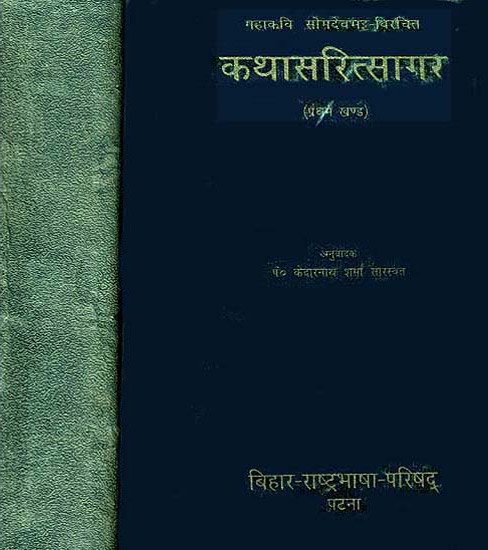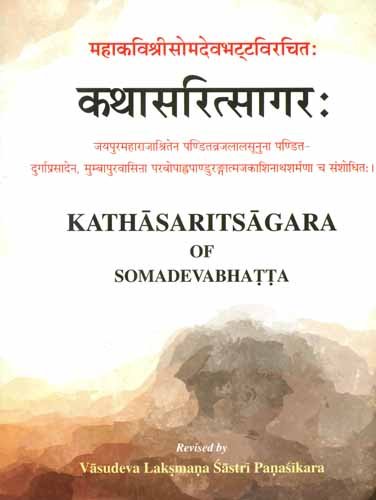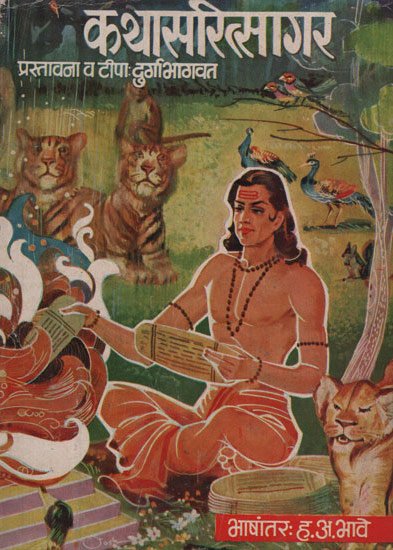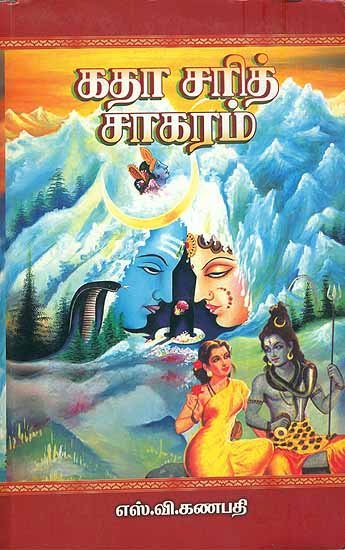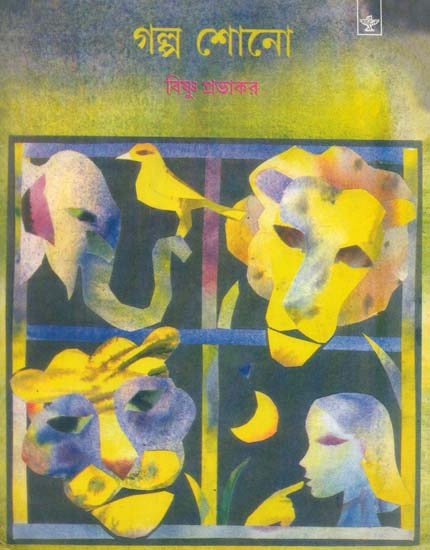Kathasaritsagara [sanskrit]
by C. H. Tawney | 2014 | 226,424 words | ISBN-13: 9789350501351
The Sanskrit edition of the Kathasaritsagara referencing the English translation and grammatical analysis. Written by Somadeva and dating from the 12th century, the Kathasaritsagara (or Katha-sarit-sagara) represents an epic legend narrating the adventures of Naravahanadatta as he strives to become the destined emperor of the Vidyadharas. Alternative titles: (Kathāsaritsāgara, कथासरित्सागर, Kathā-sarit-sāgara)
Verse 8.1.185
तत्रान्याः पितृवेश्मसु स्थितवतीरानाय्य स स्वप्रिया दत्तैस् तत्पितृभिर् गजाश्वनिवहैस् ताभिः सहैवागतः ।
नानारत्नसुपूर्णभारविनतैर् उष्ट्रैश् च संख्यातिगैर् लीलादर्शितदिग्जयोत्थविभवश् चक्रे प्रजाकौतुकम् ॥ १८५ ॥
tatrānyāḥ pitṛveśmasu sthitavatīrānāyya sa svapriyā dattais tatpitṛbhir gajāśvanivahais tābhiḥ sahaivāgataḥ |
nānāratnasupūrṇabhāravinatair uṣṭraiś ca saṃkhyātigair līlādarśitadigjayotthavibhavaś cakre prajākautukam || 185 ||
The English translation of Kathasaritsagara Verse 8.1.185 is contained in the book The Ocean of Story by C.H. Tawney. This book is available online or you could buy the latest edition:
Read online Buy now! The English translation by C.H. Tawney (2014)
Glossary of Sanskrit terms
Note: This extracts Sanskrit terms and links to English definitions from the glossary, based on an experimental segmentation of verse (8.1.185). Some terms could be superfluous while some might not be mentioned. Click on the word to show English definitions.
Tatra, Ani, Anya, Pitriveshman, Sthitavati, Anayya, Svapriya, Datta, Tat, Tad, Pitri, Gaja, Iva, Saha, Sah, Agata, Nanaratna, Supurna, Bharavi, Nata, Ushtra, Sankhyatiga, Lila, Arshin, Digjaya, Uttha, Vibhava, Vibhu, Cakra, Cakri, Praja, Kautuka,
Analysis of Sanskrit grammar
Note: this is an experimental feature and only shows the first possible analysis of the Sanskrit text (Kathasaritsagara Verse 8.1.185). If the system was successful in segmenting the sentence, you will see of which words it is made up of, generally consisting of Nouns, Pronouns, Verbs, Participles and Indeclinables. Click on the link to show all possible derivations of the word.
- Line 1: “tatrānyāḥ pitṛveśmasu sthitavatīrānāyya sa svapriyā dattais tatpitṛbhir gajāśvanivahais tābhiḥ sahaivāgataḥ ”
- tatrā -
-
tatra (indeclinable adverb)[indeclinable adverb]tatra (indeclinable correlative)[indeclinable correlative]tatra (indeclinable)[indeclinable]
- anyāḥ -
-
anī (noun, feminine)[ablative single], [genitive single]anyā (noun, feminine)[nominative plural], [accusative plural]√an (verb class 2)[optative active second single]
- pitṛveśmasu -
-
pitṛveśman (noun, neuter)[locative plural]
- sthitavatīr -
-
√sthā -> sthitavatī (participle, feminine)[accusative plural from √sthā class 1 verb]
- ānāyya -
-
ānāyya (noun, masculine)[compound], [vocative single]ānāyya (noun, neuter)[compound], [vocative single]
- sa -
-
sa (noun, neuter)[compound], [vocative single]sa (noun, masculine)[nominative single]
- svapriyā* -
-
svapriya (noun, masculine)[nominative plural], [vocative plural]svapriyā (noun, feminine)[nominative plural], [vocative plural], [accusative plural]
- dattais -
-
datta (noun, masculine)[instrumental plural]datta (noun, neuter)[instrumental plural]
- tat -
-
tat (indeclinable correlative)[indeclinable correlative]tad (noun, neuter)[compound], [nominative single], [accusative single]
- pitṛbhir -
-
pitṛ (noun, masculine)[instrumental plural]
- gajā -
-
gaja (noun, masculine)[compound], [vocative single]gajā (noun, feminine)[nominative single]√gaj (verb class 1)[imperative active second single]
- aśvan -
-
√śū (verb class 1)[aorist active third plural]
- iva -
-
iva (indeclinable adverb)[indeclinable adverb]iva (indeclinable)[indeclinable]
- hais -
-
ha (noun, masculine)[instrumental plural]ha (noun, neuter)[instrumental plural]√hā (verb class 1)[optative active second single]
- tābhiḥ -
-
tā (noun, feminine)[instrumental plural]sā (noun, feminine)[instrumental plural]
- sahai -
-
saha (indeclinable postposition)[indeclinable postposition]saha (noun, masculine)[compound], [vocative single]saha (noun, neuter)[compound], [vocative single]sahā (noun, feminine)[nominative single]sah (noun, masculine)[instrumental single]sah (noun, neuter)[instrumental single]√sah (verb class 1)[imperative active second single], [imperative middle first single]
- aivā -
-
√i (verb class 2)[imperfect active first dual]
- agataḥ -
-
agata (noun, masculine)[nominative single]√ag (verb class 1)[present active third dual]
- Line 2: “nānāratnasupūrṇabhāravinatair uṣṭraiś ca saṃkhyātigair līlādarśitadigjayotthavibhavaś cakre prajākautukam ”
- nānāratna -
-
nānāratna (noun, masculine)[compound], [vocative single]nānāratna (noun, neuter)[compound], [vocative single]
- supūrṇa -
-
supūrṇa (noun, masculine)[compound], [vocative single]supūrṇa (noun, neuter)[compound], [vocative single]
- bhāravi -
-
bhāravi (noun, masculine)[compound], [adverb]bhāravī (noun, feminine)[adverb], [vocative single]
- natair -
-
nata (noun, masculine)[instrumental plural]nata (noun, neuter)[instrumental plural]√nam -> nata (participle, masculine)[instrumental plural from √nam class 1 verb]√nam -> nata (participle, neuter)[instrumental plural from √nam class 1 verb]
- uṣṭraiś -
-
uṣṭra (noun, masculine)[instrumental plural]
- ca -
-
ca (indeclinable conjunction)[indeclinable conjunction]ca (noun, masculine)[compound], [vocative single]ca (noun, neuter)[compound], [vocative single]
- saṅkhyātigair -
-
saṅkhyātiga (noun, masculine)[instrumental plural]saṅkhyātiga (noun, neuter)[instrumental plural]
- līlād -
-
līla (noun, masculine)[adverb], [ablative single]līla (noun, neuter)[adverb], [ablative single]
- arśi -
-
arśin (noun, masculine)[compound], [adverb]arśin (noun, neuter)[compound], [adverb], [nominative single], [vocative single], [accusative single]
- ta -
-
ta (noun, masculine)[compound], [vocative single]ta (noun, neuter)[compound], [vocative single]tan (noun, masculine)[compound]
- digjayo -
-
digjaya (noun, masculine)[compound], [vocative single]
- uttha -
-
uttha (noun, masculine)[compound], [vocative single]uttha (noun, neuter)[compound], [vocative single]
- vibhavaś -
-
vibhava (noun, masculine)[nominative single]vibhu (noun, masculine)[nominative plural], [vocative plural]vibhu (noun, feminine)[nominative plural], [vocative plural]
- cakre -
-
cakra (noun, masculine)[locative single]cakra (noun, neuter)[nominative dual], [vocative dual], [accusative dual], [locative single]cakrā (noun, feminine)[nominative dual], [vocative single], [vocative dual], [accusative dual]cakri (noun, masculine)[vocative single]cakri (noun, feminine)[vocative single]√kṛ (verb class 1)[perfect middle first single], [perfect middle third single]√kṛ (verb class 2)[perfect middle first single], [perfect middle third single]√kṛ (verb class 5)[perfect middle first single], [perfect middle third single]√kṛ (verb class 8)[perfect middle first single], [perfect middle third single]√kṛ (verb class 3)[perfect middle first single], [perfect middle third single]√kṛ (verb class 6)[perfect middle first single], [perfect middle third single]
- prajā -
-
prajā (noun, feminine)[nominative single]
- kautukam -
-
kautuka (noun, neuter)[adverb], [nominative single], [accusative single]
Other editions:
Also see the following editions of the Sanskrit text or (alternative) English translations of the Kathasaritsagara Verse 8.1.185
Kathasaritsagar
by Kedarnath Sharma Saraswat (2005)
The Only Edition with the Sanskrit Text and its Hindi Translation (An Old and Rare Book) Set of 3 Vol.
Buy now!
Kathasaritsagara of Somadeva Bhatta (Sanskrit Text Only)
by Vasudeva Laksmana Sastri (2013)
Katha Sarit Sagar in Marathi
by H. A Bhave (1995)
Set of 5 Volumes; Published by Varada Books, Pune. 2256 pages (Throughout B/W Illustrations).
Buy now!
Katha Sarit Sagara (Tamil)
by S. V. Ganapati (எஸ். வி. கணபதி) (2014)
[கதா சரித் சாகரம்] Published by Alliance Publications.
Buy now!
Galpa Shono
by Abhijit Chattopadhyay (2014)
[গল্প শোনো] Galpa Shono: Bengali Translation of 'Suno Kahani From Katha Sarit Sagar'; 9788126015436; Published by Sahitya Akademi, Delhi.
Buy now!Preview of verse 8.1.185 in Bengali sript:
তত্রান্যাঃ পিতৃবেশ্মসু স্থিতবতীরানায্য স স্বপ্রিযা দত্তৈস্ তত্পিতৃভির্ গজাশ্বনিবহৈস্ তাভিঃ সহৈবাগতঃ ।
নানারত্নসুপূর্ণভারবিনতৈর্ উষ্ট্রৈশ্ চ সংখ্যাতিগৈর্ লীলাদর্শিতদিগ্জযোত্থবিভবশ্ চক্রে প্রজাকৌতুকম্ ॥ ১৮৫ ॥
![Kathasaritsagara [sanskrit] - book cover](/uploads/a/Katha-Sarit-Sagara.jpg)
